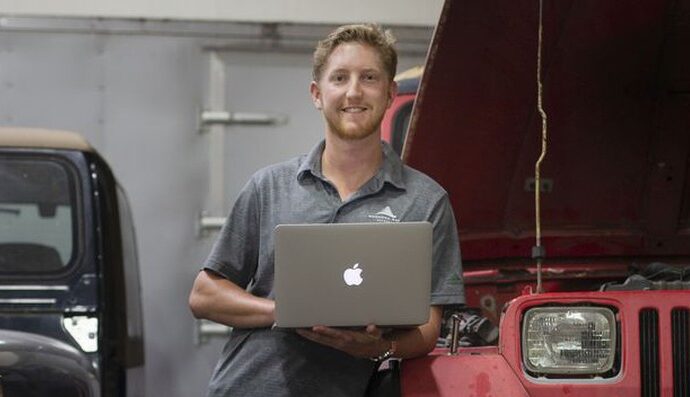Workforce WindsorEssex interviews different professionals for an inside look into their work.
As we take a look at workers in the transportation and warehousing sector, we spoke with Patrick who works as the Business Development Leader of Ettractive Inc.
How did you get started in your line of work?
When I was in school, I went to St. Clair [College] for marketing. When I graduated, there were options for co-op, but if you were able to secure a full-time position then you were able to forgo your co-op. I thought to myself, “You know what? Let’s benefit myself, let try and find a full-time job so I could start getting paid out of school,” and the people who are the most willing to take risks on marketing and sales grads are typically logistics companies because they are high-volume sales.
So, that’s where I got my start. I was hired at Landstar Global Logistics, moved up to a sales manager role there shortly after a year. If you are motivated and dedicated, you can easily fire your way through the ranks; there are lot of companies that will like to take you on. I worked there for an additional year as sales manager, and Landstar prioritizes their internal technology and leverages that to gain new customers. They have a really good internal application for pricing, load tracking, available loads, existing customers, and customers who have kind of fallen off the map. Having access to that information was a pillar to the success that I had early on.
I figured, “I’m only going to make a change based on the technology that other companies have.” I looked into Ettractive and they were focused on the electrification of the commercial market; all the trucks that I was familiar with, they were working on the electric applications of them. Obviously, with the year that it’s been – very focused on electric vehicles – I figured it was a good move for me career-wise. Once I got in [at Ettractive], I was able to leverage all the contacts I made in the logistics world who had batted around the idea of electrification or had prioritized technology and advancement. Trying to be at the forefront of the technology game in logistics was pretty important and crucial in my decision.
What does your average day looks like?
The average day at Ettractive is not so much the pounding-the-phone sales game that I was used to. Being now in business development rather than high-volume sales, you get to work not only with your customers, but also the engineering team to develop different, bespoke solutions for traditional applications. It’s a lot of, “Is this possible? Is this feasible? Would the return-on-investment be worth it for you guys?” based on electrification and gas savings.
An average day is full of meetings, but also being able to go back to your engineering team with potential scenarios and seeing what we can come up with or develop for those customers. No day is similar; we work on projects whether it be the consulting side of things, for the business, or for actual engineering work in software and hardware. At the same time, it’s keeping all your current customers satisfied at the same time as making sure they don’t fall behind in the game of evolving technology.
What is the most rewarding part of your job?
My favourite part about being at Ettractive is that we’re at the forefront of the innovation in the sector. Whoever wants to call you and make those connections is already passionate about trying something new. Having everybody who wants to be a forerunner of the development of AI technology in the logistics game, it’s an exciting phone call every day.
Do you ever hear misconceptions about your job? How do you respond to them?
People typically think I’m an engineer just because we do work with advanced technologies [at Ettractive]. But, while working at Landstar, the misconception of saying you work in trucking sales is that the industry is just trucking. It’s about building those relationships with people to make sure that not only they trust you, but the service they’re getting. The misconception was that I was selling a truck to go from ‘a’ to ‘b;’ it’s that you’re selling the technology that Landstar had for you to feel comfortable giving your load to a certain carrier. It’s not just saying, “Here’s my truck, book it;” it’s a small piece of the puzzle. You have to make sure that not only is the load going to be delivered, but whoever is working on it is working professionally and that they don’t fit into the stigma that a lot of people think trucking is.
What advice would you give to someone thinking of entering your field?
I think advice goes as far as not only something looking to enter my field, but also anybody looking for a break into the full-time job market, is to give logistics a chance. They are more than willing to take risks; their entire industry is based on accepting risks. No matter what they do day-to-day involves risk, so they’re willing to take risks on you. So, don’t be afraid of jumping into the job market with a logistics company or a supply-chain management company.
For anybody who’s already interested in the industry, I would say that you don’t have to be at the biggest company in the world to start. If it’s a smaller company and you really respect the person that you’re talking to on the phone or in an interview, give them a chance and I’m sure it will pay off; respect in this industry goes a long way.

